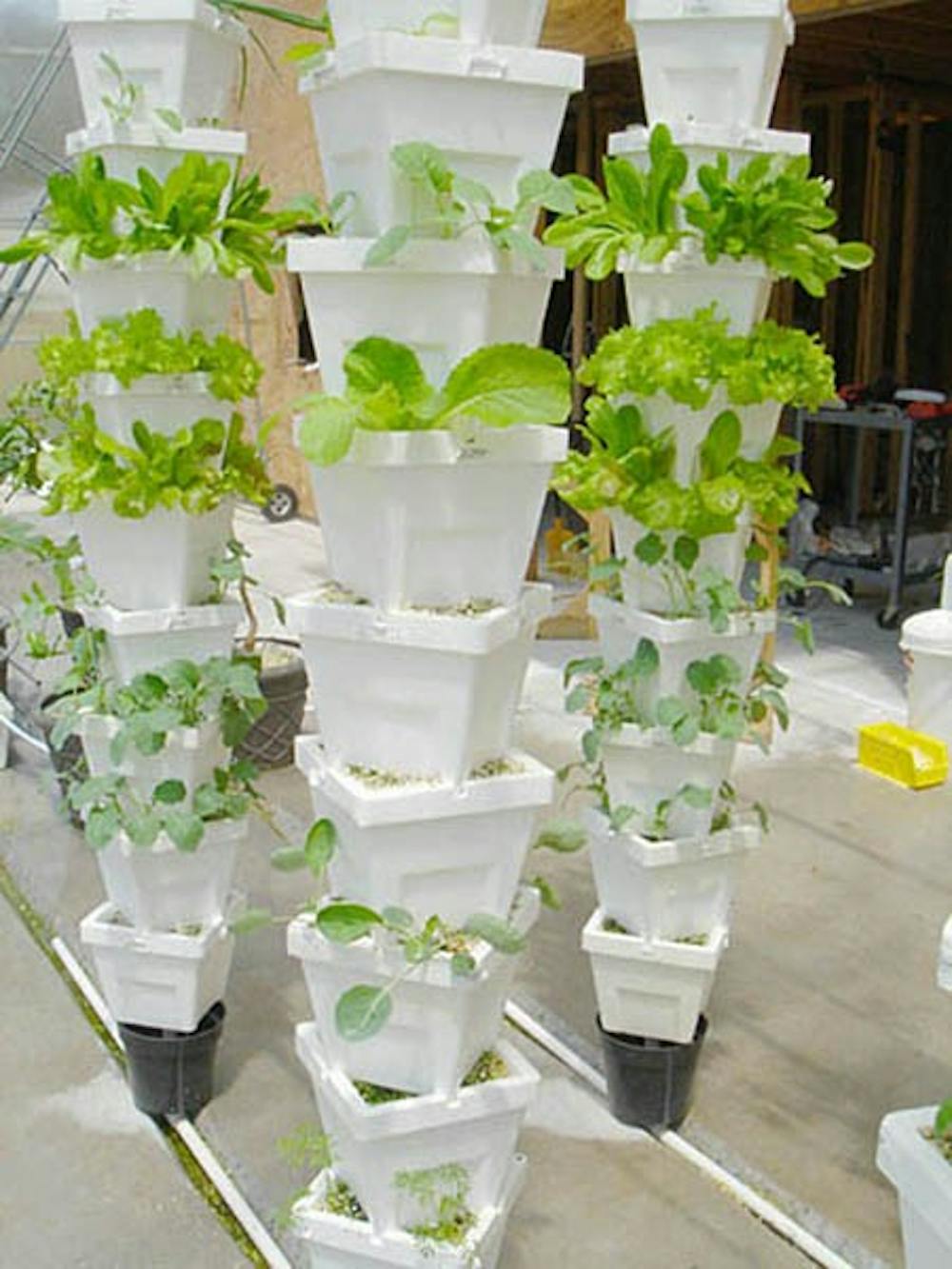A nonprofit ASU organization hopes to connect the Tempe community to fresh, locally grown food that leaves no carbon footprint by creating a soil-free hydroponic farm.
A small group of fellows from ASU’s chapter of the Roosevelt Institute, a national public policy think tank, collaborated on the idea for the farm. They originally imagined a community garden, but wanted to take it a step further.
Because ASU is known as a leader in innovation, the students decided to use current technology and produce more nutrient-rich food with less water than traditional farming, said sustainability and urban and metropolitan studies senior Gabriel Sanchez, who contributes to the hydroponic farm project as a fellow of entrepreneurship and research.
“Our farm will be beneficial to ASU and the community because it will ... drastically reduce consumption of fossil fuels associated with food on campus, and it’s a great strategy to solve the issues of food security and growing population,” Sanchez said.
If implemented, ASU’s hydroponic farm will be the only university model of its type not only used for research, but also focused on producing fresh food for the community, Sanchez said.
The Roosevelt Institute at ASU seeks to make positive changes in communities through education, economic development, health care, environmental changes, diplomacy and equal justice.
“What we produce are ideas that we try to implement so that the future that we inherit basically is what we want to see,” said philosophy junior Joshua Judd, who works for the national Roosevelt Institute and contributes to the project as a fellow of societal transformation and intellectual fusion.
The farm will ideally be an indoor patio on the Tempe campus, Sanchez said, where it will produce fresh organic food that the organization hopes to sell through farmers markets and donate to local food banks.
The world faces an escalating population and food crisis, one that developed countries like the U.S. do not see, said urban planning senior Kimmie Bellotti, who is designing the farm.
According to the U.S. Census Bureau website, the world population will reach more than 9 billion people by 2050. Bellotti, who also contributes to the project as a fellow for social embeddedness and student success, said as the population continues to grow, the planet alone will not be able to sustain everyone.
“If [the farm] works and it can be applied ... in developing countries, it would be amazing. We would have solved that issue of food availability,” Bellotti said.
Many Americans also do not have access to healthy food because organic, locally grown food is often more expensive, she said.
But the hydroponic garden should provide equal access to healthy food and may offer lower prices, Bellotti added.
The modern farm draws from ancient methods used in the Hanging Gardens of Babylon and from chinampas, floating islands used by ancient Aztecs to grow food on lakes.
The farm will consist of about 250 pots in 20 to 50 vertical towers, which will each hold three, five or six pots, Sanchez said. Water will circulate through the towers by filtering through the pots and then circling upward through a pump. The pots will not hold soil for the plants, but coconut fiber that supports the root system and holds more water to yield more nutrients, Sanchez explained.
Hydroponic farms can grow several types of vegetation, such as tomatoes or lettuce, said Judd.
While funding for the 250-pot hydroponic system will cost about $3,000 to implement and will not be difficult to obtain, Sanchez said finding a space on campus for the farm will be the organization’s biggest challenge.
“There aren’t very many spaces on campus that are just available to start a farm in,” Sanchez said.
The Roosevelt Institute at ASU wants the farm to be on campus and indoors because it will be easier to control the environment, but Sanchez said they will work with any plot of land they get.
The ASU chapter has already received a grant from the national Roosevelt Institute, which will cover one sixth of the funding for the farm. The chapter hopes to find a space on campus within the next six months and start growing food by fall 2011.
They presented their idea at the Southwest Sustainable Food Summit last weekend and received a very positive and motivating response, Sanchez said.
The next goal is to produce and present a proposal for both ASU administration and the Roosevelt Research Conference, which will take place in April.
The organization has posted an online survey about the hydroponic garden to get public feedback, said Bellotti. She said they have not yet received a negative response.
“Challenges will arise but the way we see it, any challenge is a new opportunity,” Sanchez said.
Reach the reporter at hhuskins@asu.edu





